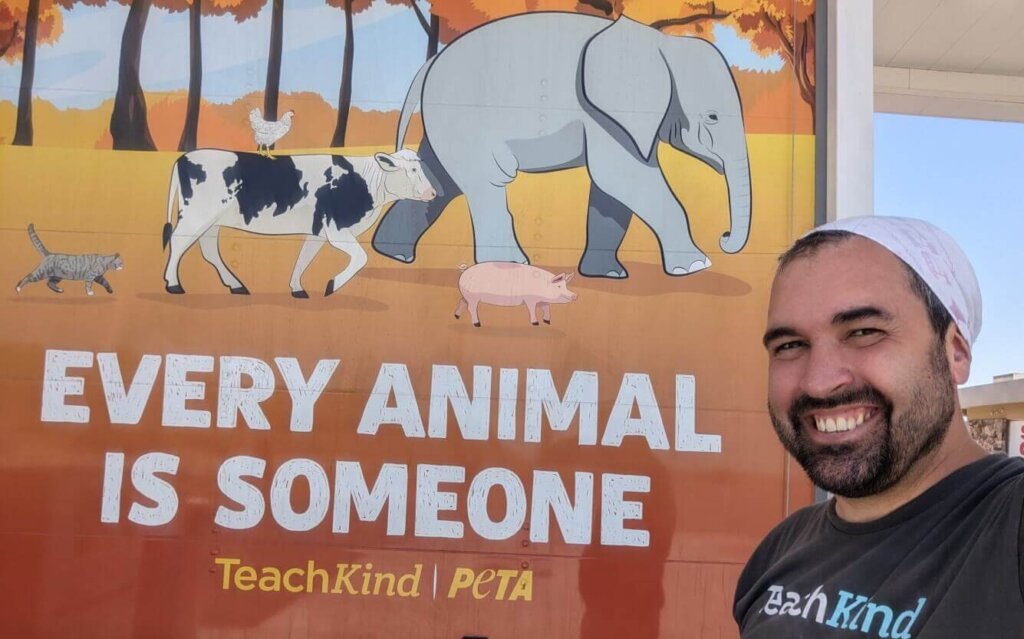FFA and 4-H: Teaching Kids to Harden Their Hearts
School should be a place where children learn valuable information and life skills that help them become kind, productive members of society. However, when schools offer animal agriculture programs, including through groups like 4-H and the National FFA Organization (FFA), they become places that teach children to abuse and exploit animals for awards, accolades, and money. The animals involved in these programs are usually headed for one of two heartbreaking outcomes: being sold at auction for slaughter or used as “breeders” (and likely sent to slaughter once they are no longer profitable or their bodies give out). These programs send the harmful message that it’s acceptable to send their animal friends—even if they have cared for and bonded with them for months—to violent, terrifying deaths at slaughterhouses.
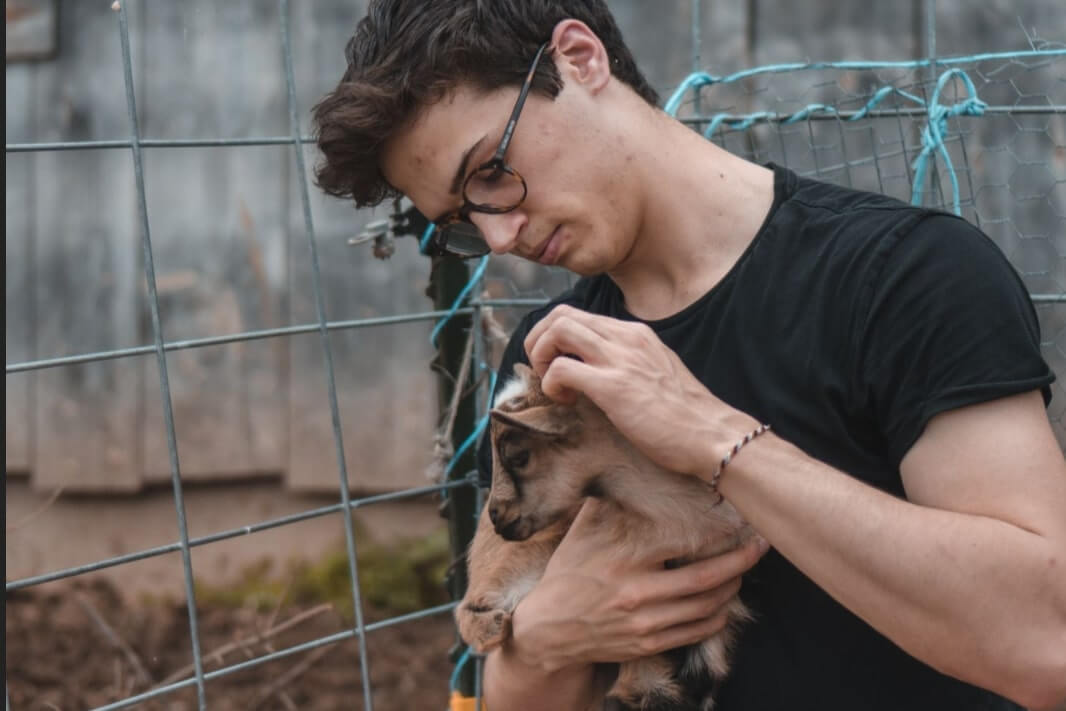
Many young people join FFA or 4-H programs because they’re interested in animals, but the goals of these programs demand that children develop a harmful disconnect from those very animals, and the consequences are detrimental to everyone involved.
Why agriculture programs that use animals,
like FFA & 4-H, don’t belong in schools:
They Foster Callousness Toward Others
4-H encourages members to raise animals for “projects.” Even early on, students are taught to “identify parts of [their] animal and cuts of meat”—desensitizing them to the reality that other animals are more than just the parts of their bodies humans will buy to eat. While students learn how to care for the animals, it’s important to remember that the training focuses on caring for them in a way that maximizes profit and wins competitions.
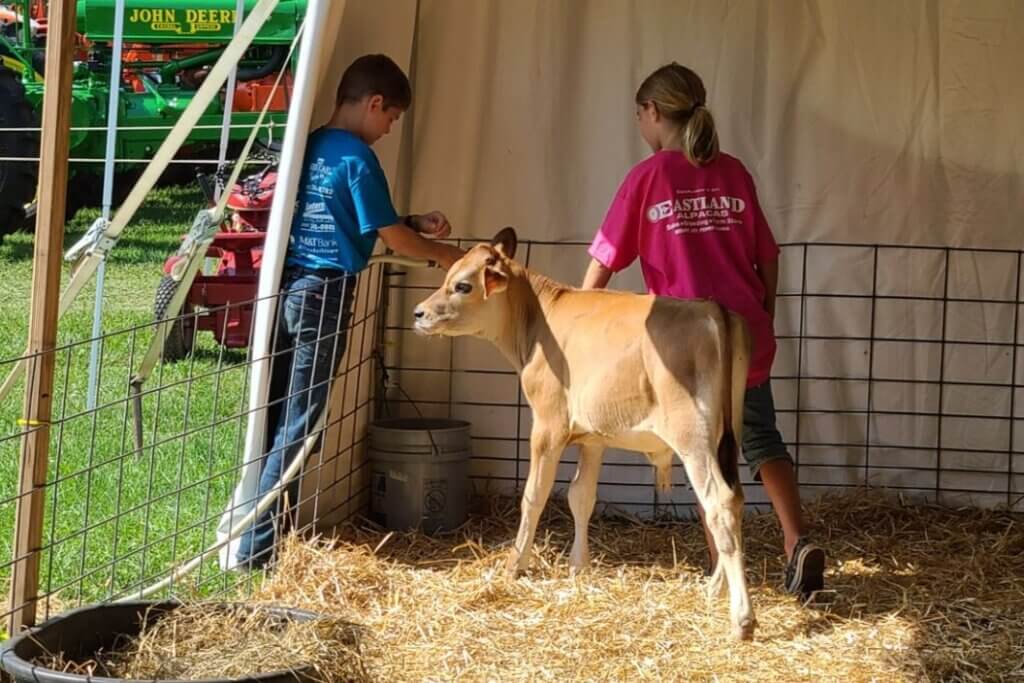
Instead of teaching kids that animals are individuals who have unique personalities, needs, and feelings, these programs teach them to view their fellow animals as nothing more than a way to make money. They’re told to celebrate as their friend is auctioned off to the highest bidder. Rather than learning about the ways in which pigs and cows are similar to us, how they care for their young, and how they’re social and smart, kids are encouraged to fatten them up to become bacon or told to turn them into good breeders. In short, they’re forced to harden a piece of their hearts.
They Send A Dangerous Message
Children’s natural affinity and respect for animals should never be suppressed to foster a cold, uncaring attitude toward the intelligent, social beings they care for. Teaching kindness is essential for the health and future of our children. Society reveals its true values when schools promote programs that lead to the death of animals they have befriended and actively earned the trust of.
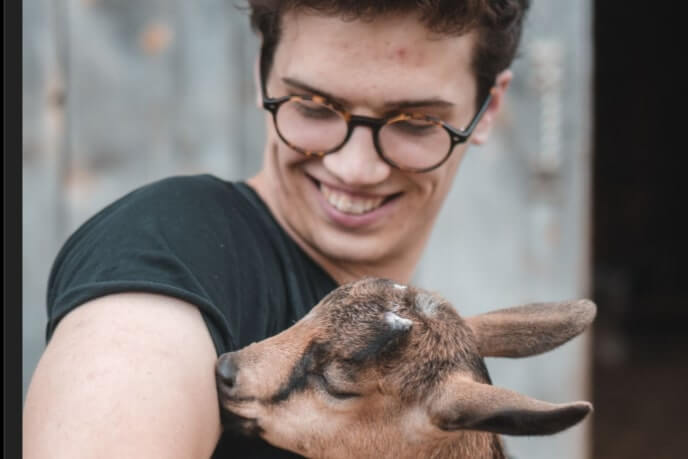
TeachKind receives reports of kids hurting animals with alarming frequency. Given the widespread bullying and youth violence in schools, along with the disturbing reports of young people abusing animals, it is vital and timely to establish a standard of compassion in schools. It’s critical that students understand that violence against anyone is wrong, regardless of our differences. This includes the violence inherent in sending an animal to slaughter.
Using animals as “teaching tools” in school projects puts them at risk of harm and sends students the dangerous message that animals are nothing more than commodities to be bought, sold, and slaughtered. Programs like FFA and 4-H can teach kids to see fellow living, feeling beings as products and prize money, not individuals who deserve respect.
They Teach Kids to Disconnect
Agricultural programs teach children to disconnect from who animals really are. Instead of recognizing lambs, sheep, pigs, cows, and chickens as individuals who can think, feel, and suffer, students learn to harden their hearts to the animals’ ultimate fate—to be subjected to the cruel practices prevalent on modern-day farms.
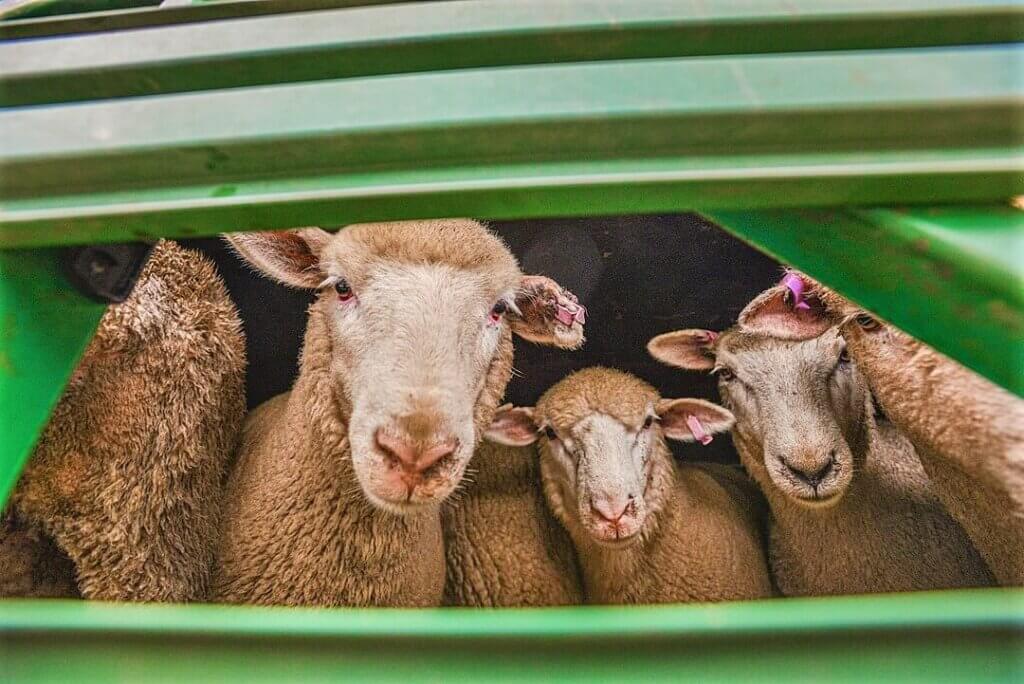
Just like the cats and dogs many of us love and share our homes with, pigs, cows, chickens, and other animals used for food are intelligent, sentient beings. They experience joy, fear, pain, and love—and they cherish their lives. Imagine being told to send a beloved family dog or cat to slaughter; most of us would be heartbroken because of the trust and bond we share with them.
Children who participate in animal agriculture programs often form similar bonds with the animals they care for—yet these programs encourage them to ignore those feelings and accept that their animal friends will be sold and killed. This is deeply unfair to the animals, who learn to trust and love the children looking after them. It’s also harmful to the children themselves, as it teaches them to betray those they care about for profit or recognition. Some kids are traumatized when they realize what will happen to the animals they’ve grown to love. If they aren’t shamed or coaxed into suppressing their feelings, they may go to great lengths to keep their animal companions from harm.
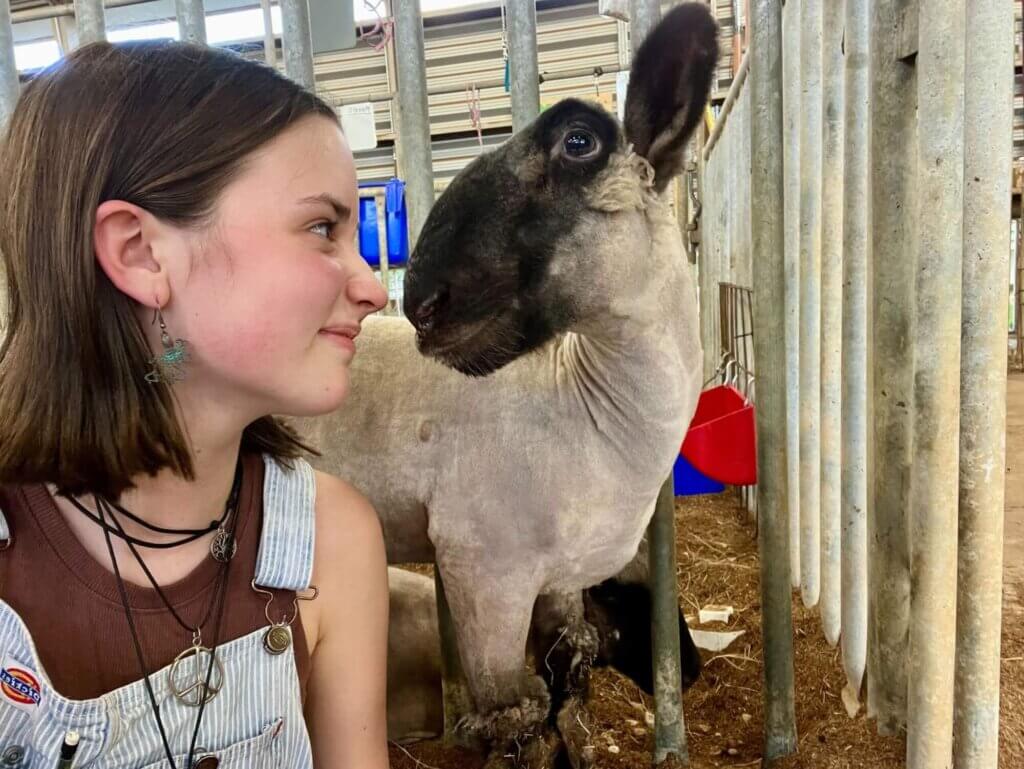
They Encourage Violence, Not Empathy
Animals don’t belong to us, and they value their lives and families just as we value ours. A culture in which the manipulation, exploitation, and slaughter of animals is standard practice is one that views them as possessions, products, and commodities instead of individuals who experience feelings, belong to families, and form friendships. Widespread institutionalized violence will continue as long as humans view living, feeling animals as objects and teach children to believe the same. Instead of leaning into comfort and convenience, educators can help students become more attuned to the needs of others by ensuring their programs boost empathy.
Love Animals? Don’t Sell Them to Be Killed
When students join 4-H or FFA, not all of them realize that the animals they’ll spend months caring for and bonding with will eventually be sold into an exploitative and deadly industry. We’ve heard from numerous students who were heartbroken to find out that the animals they’d grown to know and love would be sold and killed. Here are the stories of two of them who refused to turn their backs on the animals they’d befriended:
- Alena Hidalgo of Pearland, Texas, spent months getting to know Gizmo, the pig she had purchased through FFA. It didn’t take long for the two to bond as she played with and cared for him every day. She saw him as the unique, sentient, intelligent individual he was—not as food or a product. So when the time came to send her friend to slaughter, she knew she had to do everything in her power to save him.
Alena raised her voice in defense of Gizmo for weeks. Along with her friend Kayree, she not only persuaded her school to let her send him to a local sanctuary but also tried to save another pig, Kurtis, who, unfortunately, was sent to slaughter by another student. At the sanctuary, Gizmo is able to spend his days enjoying life, and he’ll never be slaughtered. As for Alena, she decided to go vegan and quit FFA.
- Bruno Barba of Fullerton, California, joined the FFA program at his high school and bought a young pig from a feedlot, naming her Lola. He learned how to take care of her—feeding her, cleaning her living area, and walking her, all according to FFA’s plan. But as time passed and he got to know her unique, loving personality, he became anxious about her fate. The pivotal moment came when he saw student-hired butchers slaughtering the cows he’d come to know over the past few months. He realized that the animals deserved better, and he couldn’t betray Lola, knowing she would follow him anywhere, even unknowingly, to a bloody, painful slaughter.
Instead of sending Lola to a butcher or condemning her to life in a concrete pen, Bruno found her a new home at Farm Sanctuary in Watkins Glen, New York, where she can enjoy the rest of her life with other pigs and play in the grass and mud. Neither he nor his awesome mom could look at meat, eggs, or dairy as food again, so they switched to vegan eating.
The Heartbreaking Reality of Lost Battles
There are many cases in which children try to spare their animal friends the gruesome fates awaiting them, but, sadly, they don’t always have happy endings, no matter how bravely and persistently the child calls for adults to do what’s right. Such was the case with 9-year-old E.L. and her beloved goat, Cedar. After auctioning him off at a county fair, as most children do in animal agriculture programs, E.L. had a change of heart and didn’t want him to be slaughtered. With the help of her mother, she offered to forfeit the prize money she had won in exchange for his life and even drove her friend to a safe haven hundreds of miles away in an attempt to save him. But the hardened heart of the fair’s livestock manager couldn’t be softened, and he had the police seize the goat and deliver him to be slaughtered. Even though E.L. and her mother sued the County of Shasta and Shasta County Sheriff’s Office over this injustice and won $300,000 in an incredible victory, it’s too late for Cedar, whose life could have been spared if only the adults involved would have had compassion for him and E.L. instead of cruelly slaughtering him for their own profit.
There’s No Excuse for Animal Abuse
None of the cruelty inflicted on animals and children in the stories above needed to happen. No one needs to eat animals. Vegan eating is the most humane, sustainable, and healthy choice. 4-H, FFA, and other agricultural programs could easily end their cruel practices and focus instead on the ethical and universally beneficial activities they already promote, including gardening, expressive arts, and leadership programs.
There is no justifiable reason for schools to support the cruel, greedy animal agriculture industry. Instead, schools should provide opportunities that help kids grow into compassionate, responsible individuals who will make the world a better place for everyone. Students ought to be taught to stand up for others who need help, not to stand by quietly as someone they’ve grown to love is sent to be killed.
Learn Compassionate Animal Care with LEAP
If you live near a participating animal sanctuary, you can encourage high school students to take part in the Leaders for Ethics, Animals, and the Planet (LEAP) program, which is a compassionate alternative to 4-H and FFA programs that harm animals. They’d have many of the same opportunities that other agriculture programs offer—working with other students from around the region, participating in local events, learning from experts and mentors, receiving financial compensation for their work, and, of course, spending time with the animals—without being encouraged to disconnect from their empathy for other sentient beings and forced to allow the animal they’ve cared for and bonded with to be killed for food. If you’re not near an existing LEAP program, find out how to start one in your area!
Every Animal is Someone
Instead of teaching children to harden their hearts, let’s help them recognize and respect the individuality of all animals. After all, every animal is someone!
